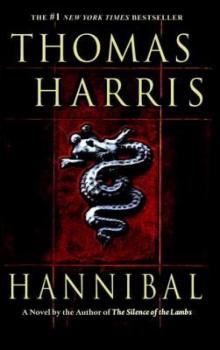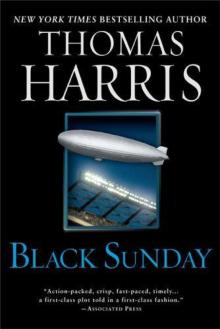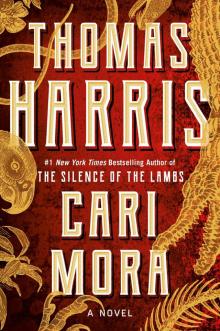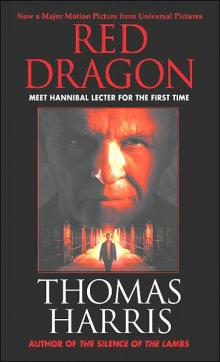- Home
- Thomas Harris
Hannibal Page 21
Hannibal Read online
Page 21
“I will. I just have to think about the timing.” Margot crushed two walnuts together and let the shells fall on Mason’s sheet. “Don’t think too goddamned long, Smiley.” Her cycle pants whistled like building steam as she walked out of the room.
CHAPTER
46
ARDELIA MAPP cooked when she felt like it, and when she cooked the result was extremely good. Her heritage was a combination of Jamaican and Gullah, and at the moment she was making jerk chicken, seeding a Scotch bonnet pepper she held carefully by the stem. She refused to pay the premium for cut-up chickens and had Starling busy with the cleaver and the cutting board.
“If you leave the pieces whole, Starling, they won’t take the seasoning like they will if you cut them up,” she explained, not for the first time. “Here,” she said, taking the cleaver and splitting a back with such force bone splinters stuck to her apron. “Like that. What are you doing throwing those necks out? Put that handsome thing back in there.”
And a minute later, “I was at the post office today. Mailing the shoes to my mom,” Mapp said.
“I was in the post office too, I could have taken them.”
“Did you hear anything at the post office?”
“Nope.”
Mapp nodded, not surprised. “The drum says they’re covering your mail.”
“Who is?”
“Confidential directive from the Postal Inspector. You didn’t know that, did you?”
“No.”
“So discover it some other way, we need to cover my post office buddy.”
“Okay.” Starling put down her cleaver for a moment. “Jesus, Ardelia.”
Starling had stood at the post office counter and bought her stamps, reading nothing in the closed faces of the busy postal clerks, most of them African-American, and several of whom she knew. Clearly someone wanted to help her, but it was a big chance to take with criminal penalties and your pension on the line. Clearly that someone trusted Ardelia more than Starling. Along with her anxiety, Starling felt a happy flash at having a favor from the African-American hot line. Maybe it expressed a tacit judgment of self-defense in the shooting of Evelda Drumgo.
“Now, take those green onions and mash them with the knife handle and give them here. Mash the green and all,” Ardelia said.
When she had finished the prep work, Starling washed her hands and went into the absolute order of Ardelia’s living room and sat down. Ardelia came in in a minute, drying her hands on a dish towel.
“Hell kind of bullshit is this?” Ardelia said.
It was their practice to curse heartily before taking up anything truly ominous, a late-century form of whistling in the dark.
“Be Got Dam if I know,” Starling said. “Who’s the sumbitch looking at my mail, that’s the thing.”
“PI’s office is as far back as my folks can go.”
“It’s not the shooting, it’s not Evelda,” Starling said. “If they’re looking at my mail, it’s got to be about Dr. Lecter.”
“You turned in every damn thing he ever sent you. You down with Crawford on that.”
“Damn straight. If it’s the Bureau OPR checking up on me I can find that out, I think. If it’s Justice OPR, I don’t know.”
The Justice Department and its subsidiary, the FBI, have separate Offices of Professional Responsibility, which theoretically cooperate and sometimes collide. Such conflicts are known in-house as pissing contests, and agents caught in the middle sometimes get drowned. In addition, the Inspector General at Justice, a political appointee, can jump in anytime and take over a sensitive case.
“If they know something Hannibal Lecter’s up to, if they think he’s close, they got to let you know it to protect yourself. Starling, do you ever … feel him around you?”
Starling shook her head. “I don’t worry about him much. Not that way. I used to go a long time and not even think about it. You know that lead feeling, that heavy gray feeling when you dread something? I don’t ever have that. I just think I’d know if I had a problem.”
“What would you do, Starling? What would you do if you saw him in front of you? All of a sudden? Have you got it set in your mind? Would you throw down on him?”
“Fast as I could grab it out of my britches, I’d throw down on his ass.”
Ardelia laughed. “And then what?”
Starling’s smile went away. “That would be up to him.”
“Could you shoot him?”
“To keep my own chitterlings in place, are you kidding me? My God, I hope that never happens, Ardelia. I’d be glad if he got back in custody without anybody else getting hurt—including him. I’ll tell you though, sometimes I think, if he’s ever cornered, I’d want to take the point going in for him.”
“Don’t even say that.”
“With me he’d have a better chance to come out alive. I wouldn’t shoot him because I’m scared of him. He’s not the wolf man. It would just be up to him.”
“Are you scared of him? You better be scared enough.”
“You know what’s scary, Ardelia? It’s scary when somebody tells you the truth. I’d like to see him beat the needle. If he can do that, and he’s put in an institution, there’s enough academic interest in him to keep his treatment pretty good. And he won’t have any problem with roommates. If he was in the slams I’d thank him for his note. Can’t waste a man that’s crazy enough to tell the truth.”
“There’s a reason somebody’s monitoring your mail. They got a court order and it’s someplace under seal. We’re not staked out yet—we’d have spotted it,” Ardelia said. “I wouldn’t put it past those sons of bitches to know he’s coming and not tell you. You watch out tomorrow.”
“Mr. Crawford would have told us. They can’t mount much against Lecter without bringing Mr. Crawford in on it.”
“Jack Crawford is history, Starling. You’ve got a blind spot there. What if they mount something against you?. For having a wise mouth, for not letting Krendler get in your pants? What if somebody wants to trash you? Hey, I’m serious about covering my source now.”
“Is there something we can do for your post office buddy? Do we need to do something?”
“Who do you think is coming to dinner?”
“All right Ardelia! … Wait a minute, I thought I was coming to dinner.”
“You can take some home with you.”
“I ’preciate it.”
“No trouble, girl. My pleasure, in fact.”
CHAPTER
47
WHEN STARLING was a child she moved from a clapboard house that groaned in the wind to the solid redbrick of the Lutheran Orphanage.
The most ramshackle family dwelling of her early childhood had had a warm kitchen where she could share an orange with her father. But death knows where the little houses are, where people live who do dangerous work for not much money. Her father rode away from this house in his old pickup truck on the night patrol that killed him.
Starling rode away from her foster home on a slaughter horse while they were killing the lambs, and she found a kind of refuge in the Lutheran Orphanage. Institutional structures, big and solid, made her feel safe ever since. The Lutherans might have been short on warmth and oranges and long on Jesus, but the rules were the rules and if you understood them you were okay.
As long as impersonal competitive testing was the challenge, or doing the job on the street, she knew she could make her place secure. But Starling had no gift for institutional politics.
Now, as she got out of her old Mustang at the beginning of the day, the high façades of Quantico were no more the great brick bosom of her refuge. Through the crazed air over the parking lot, the very entrances looked crooked.
She wanted to see Jack Crawford, but there was no time. Filming at Hogan’s Alley began as soon as the sun was well up.
The investigation of the Feliciana Fish Market Massacre required filmed reenactments made on the Hogan’s Alley shooting range at Quantico, with every shot, eve
ry trajectory, accounted for.
Starling had to perform her part. The undercover van they used was the original one with body putty, unpainted, plugging the latest bullet holes. Again and again they piled out of the old van, over and over the agent playing John Brigham went down on his face and the one playing Burke writhed on the ground. The process, using noisy blank ammunition, left her wrung out.
They finished in midafternoon.
Starling hung up her SWAT gear and found Jack Crawford in his office.
She was back to addressing him as Mr. Crawford now, and he seemed increasingly vague and distant from everyone.
“Want an Alka-Seltzer, Starling?” he said when he saw her in his office door. Crawford took a number of patent medicines in the course of the day. He was also taking Ginkgo Biloba, Saw Palmetto, St. John’s Wort and baby aspirin. He took them in a certain order from his palm, his head going back as though he were taking a shot of liquor.
In recent weeks, he had started hanging up his suit coat in the office and putting on a sweater his late wife, Bella, had knitted for him. He looked much older now than any memory she had of her own father.
“Mr. Crawford, some of my mail is being opened. They’re not very good at it. Looks like they’re steaming the glue with a teapot.”
“You’ve had mail surveillance since Lecter wrote to you.”
“They just fluoroscoped packages. That was fine, but I can read my own personal mail. Nobody’s said anything to me.”
“It’s not our OPR doing it.”
“It’s not Deputy Dawg either, Mr. Crawford—it’s somebody big enough to get a Title Three intercept warrant under seal.”
“But it looks like amateurs doing the opening?” She was quiet long enough for him to add, “Better if you noticed it that way, is it, Starling?”
“Yes, sir.”
He pursed his lips and nodded. “I’ll look into it.” He arranged his patent medicine bottles in the top drawer of his desk. “I’ll speak to Carl Schirmer at Justice, we’ll straighten that out.”
Schirmer was a lame duck. The grapevine said he’d be retiring at the end of the year—all Crawford’s cronies were retiring.
“Thank you, sir.”
“Anybody in your cop classes show much promise? Anybody recruiting ought to talk to?”
“In the forensics, I can’t tell yet—they’re shy with me in sex crimes. There’s a couple of pretty good shooters.”
“We’ve got all we need of those.” He looked at her quickly. “I didn’t mean you.”
At the end of this day of playing out his death, she went to John Brigham’s grave in Arlington National Cemetery.
Starling put her hand on his stone, still gritty from the chisel. Suddenly she had on her lips the distinct sensation of kissing his forehead, cold as marble and gritty with powder, when she came to his bier the last time and put in his hand, beneath the white glove, her own last medal as Open Combat Pistol Champion.
Now leaves were falling in Arlington, strewing the crowded ground. Starling, with her hand on John Brigham’s stone, looking over the acres of graves, wondered how many like him had been wasted by stupidity and selfishness and the bargaining of tired old men.
Whether you believe in God or not, if you are a warrior Arlington is a sacred place, and the tragedy is not to die, but to be wasted.
She felt a bond with Brigham that was no less strong because they were never lovers. On one knee beside his stone she remembered: He asked her something gently and she said no, and then he asked her if they could be friends, and meant it, and she said yes, and meant it.
Kneeling in Arlington, she thought about her father’s grave far away. She had not visited it since she graduated first in her college class and went to his grave to tell him. She wondered if it was time to go back.
The sunset through Arlington’s black branches was as orange as the orange she shared with her father; the distant bugle shivered her, the tombstone cold beneath her hand.
CHAPTER
48
WE CAN see it through the vapor of our breath—in the clear night over Newfoundland a brilliant point of light hanging in Orion, then passing slowly overhead, a Boeing 747 bucking a hundred-mile-per-hour head wind westward.
Back in steerage where the package tours go, the fifty-two members of Old World Fantasy, a tour of eleven countries in seventeen days, are returning to Detroit and Windsor, Canada. Shoulder room is twenty inches. Hip room between armrests is twenty inches. This is two inches more space than a slave had on the Middle Passage.
The passengers are being slopped with freezing-cold sandwiches of slippery meat and processed cheese food, and are rebreathing the farts and exhalations of others in economically reprocessed air, a variation on the ditch-liquor principle established by cattle and pig merchants in the l950s.
Dr. Hannibal Lecter is in the center of the middle row in steerage with children on both sides of him and a woman holding an infant at the end of the row. After so many years in cells and restraints, Dr. Lecter does not like to be confined. A computer game in the lap of the small boy beside him beeps incessantly.
Like many others scattered throughout the cheapest seats, Dr. Lecter wears a bright yellow smiley-face badge with CAN-AM TOURS on it in big red letters, and like the tourists he wears faux athletic warm-ups. His warm-ups bear the insignia of the Toronto Maple Leafs, a hockey team. Beneath his clothing, a considerable amount of cash is strapped to his body.
Dr. Lecter has been with the tour three days, having bought his place from a Paris broker of last-minute illness cancellations. The man who should have been in this seat went home to Canada in a box after his heart gave out climbing the dome of St. Peter’s.
When he reaches Detroit, Dr. Lecter must face passport control and customs. He can be sure security and immigration officers at every major airport in the western world have been alerted to watch for him. Where his picture is not taped to the wall of passport control, it is waiting under the hot button of every customs and immigration computer.
In all of this, he thinks that he may enjoy one piece of luck: The pictures the authorities are using could be of his old face. The false passport he used to enter Italy has no corresponding home-country file to provide a current likeness: In Italy, Rinaldo Pazzi had tried to simplify his own life and satisfy Mason Verger by taking the Carabinieri’s file, including the photograph and negative used on “Dr. Fell’s” permesso di soggiorno and work permit. Dr. Lecter found them in Pazzi’s briefcase and destroyed them.
Unless Pazzi took photos of “Dr. Fell” from hiding, there is a good chance that no current likeness of Dr. Lecter’s new face exists in the world. It is not so different from his old face—a little collagen added around the nose and cheeks, changed hair, spectacles—but it is different enough if attention is not called to him. For the scar on the back of his hand, he has found a durable cosmetic and a tanning agent.
He expects that at Detroit Metropolitan Airport the Immigration Service will divide the arrivees into two lines, U.S. Passports and Other. He has chosen a border city so the Other line will be full. This airplane is loaded with Canadians. Dr. Lecter thinks he can be swept through with the herd, as long as the herd accepts him. He has toured some historic sites and galleries with these tourists, he has flown in the stews of the airplane with them, but there are limits: He cannot eat this airline swill with them.
Tired and footsore, weary of their clothes and their companions, the tourists root in their supper bags, and from their sandwiches remove the lettuce, black with cold.
Dr. Lecter, not wishing to call attention to himself, waits until the other passengers have picked through this sorry fare, waits until they have gone to the bathroom and most have fallen asleep. Far at the front, a stale movie plays. Still he waits with the patience of a python. Beside him the small boy has fallen asleep over his computer game. Up and down the broad airplane, the reading lights wink out.
Then and only then, with a furtive glance around, Dr.
Lecter takes from beneath the seat in front of him his own lunch in an elegant yellow box trimmed with brown from Fauchon, the Paris caterer. It is tied with two ribbons of silk gauze in complementary colors. Dr. Lecter has provisioned himself with wonderfully aromatic truffled pâté de foie gras, and Anatolian figs still weeping from their severed stems. He has a half-bottle of a St. Estephe he favors. The silk bow yields with a whisper.
Dr. Lecter is about to savor a fig, holds it before his lips, his nostrils flared to its aroma, deciding whether to take all the fig in one glorious bite or just half, when the computer game beside him beeps. It beeps again. Without turning his head, the doctor palms the fig and looks down at the child beside him. The scents of truffle, foie gras and cognac climb from the open box.
The small boy sniffs the air. His narrow eyes, shiny as those of a rodent, slide sideways to Dr. Lecter’s lunch. He speaks with the piercing voice of a competitive sibling:
“Hey, Mister. Hey, Mister.” He’s not going to stop.
“What is it?”
“Is that one of those special meals?”
“It is not.”
“What’ve you got in there then?” The child turned his face up to Dr. Lecter in a full wheedle. “Gimme a bite?”
“I’d very much like to,” Dr. Lecter replied, noting that beneath the child’s big head, his neck was only as big around as a pork tenderloin, “but you wouldn’t like it. It’s liver.”’
“Liverwurst! Awesome! Mom won’t care, Mooaaaahm!” Unnatural child, who loves liverwurst and either whines or screams.
The woman holding the baby at the end of the row started awake.
Travelers in the row ahead, their chairs cranked back until Dr. Lecter can smell their hair, look back through the crack between seats. “We’re trying to sleep up here.”

 The Silence of the Lambs
The Silence of the Lambs Red Dragon
Red Dragon Hannibal
Hannibal Black Sunday
Black Sunday Cari Mora
Cari Mora Hannibal Rising
Hannibal Rising Red Dragon hl-1
Red Dragon hl-1 The Silence of the Lambs (Hannibal Lecter)
The Silence of the Lambs (Hannibal Lecter)